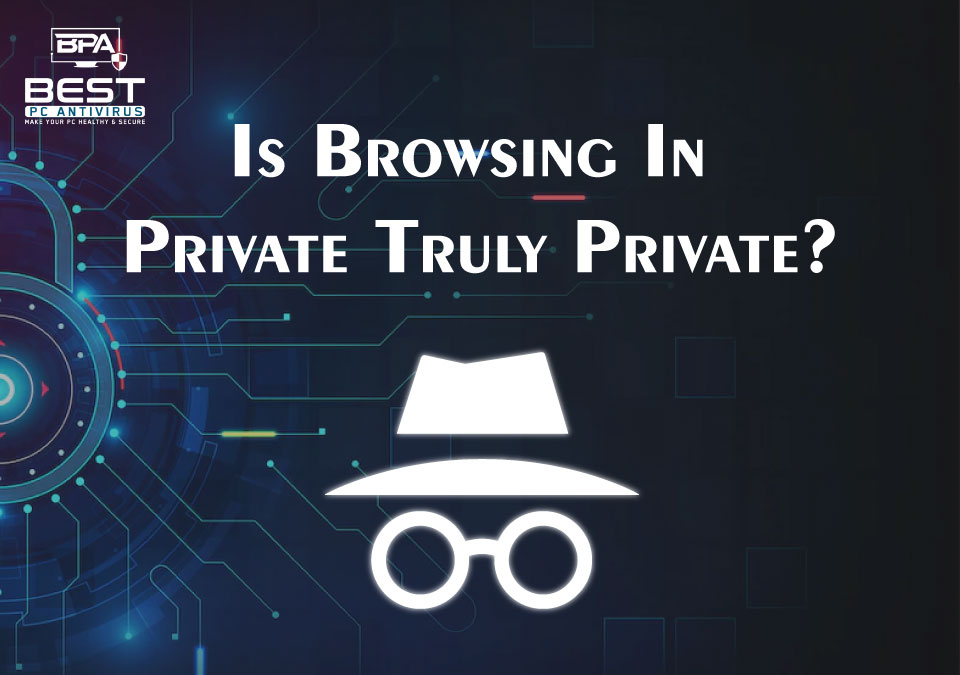You most likely expect your “private” browser to be just that. It isn’t. Private browsers, which have names like Private Browsing, Private Tab, and Private Window, are a standard feature of several web browsers. A private browsing mode can help you with a variety of tasks, but maintaining complete privacy is not one of them.
That doesn’t mean they’re useless.
It’s critical to understand what a private browser can and cannot do. For example, did you know that even when you browse in private mode, your browsing history can still be accessed in most browsers? When you go online, you most likely want privacy and security. So, how do you obtain it?
What exactly is private browsing?
Web browsers can save information about users’ activities to facilitate future visits.
How? When a browser caches web-based content such as usernames, passwords, and images, it aids in the login process. This can be beneficial to the user. However, you may not want that convenience if storing that data jeopardizes your privacy. A web browser, for example, could sell user information to third parties for marketing purposes.
Enter the realm of private browsing.
Google’s Incognito mode, for example, was not designed to mask or hide your identity. It was created primarily to make it easier to use shared computers.
Here’s how private browsing fixed the issue. Many different cookies would be stored on a shared computer due to multiple users.
That would cause confusion while browsing, with information appearing that might be useful to another user but not to you.
All browsing history, search history, and cookies are automatically erased when you use a private browser. A private browser also limits web tracking, which means websites have a harder time keeping track of you. Some private browsers will even assist you in concealing your location.
Is private browsing really private?
When you think of privacy, you probably envision yourself surfing the web completely anonymously. However, private browsing may not provide the complete veil of privacy you expect.
Private browsing allows you to remain anonymous on a work device, for example, because your information is not saved on your computer. However, your privacy ends there. Your employer, internet service provider, websites you visited, and government agencies may still have access to data such as your browsing history, passwords, and cookies.
A number of browsers provide private browsing modes. Here is an example.
- Incognito Mode is available in Google Chrome.
- Microsoft Internet Explorer and Microsoft Edge both have an InPrivate Browsing mode.
- Private Browsing is a feature of Mozilla Firefox.
- Private browsing is available in Opera.
- Safari includes a Private window.
- DuckDuckGo is a search engine that does not track, share, or log your personal information.
More on those browsers will follow.
How do private browsers work?
Private browsers enable you to keep your Internet activity private from other people who share the same computer or device. Although not all privacy settings are the same, most private browser settings will not save your cookies, browsing history, search records, or downloaded files.
Nonetheless, cookies used during private browsing sessions can provide third parties with information about your browsing behaviour. This means that your web activity can still be monitored.
Why is browsing incognito mode not truly private?
Some web browsers that support private browsing include a disclaimer explaining why using the feature does not guarantee complete privacy. The goal of private browsing is to prevent information such as browsing histories or downloaded cookies from being automatically stored on your device. Files that have been downloaded or bookmarked may still be saved in some cases. The private browsing session then only ends when the browser window is closed.
The problem persists: your activity may still be visible to the Internet service provider and the organization that provides the Internet connection, such as a school, college, or company. Websites you visit may also be able to view your session.
Is a private browser safe?
As with any other browsing session, private mode may add an extra layer of security if your device is equipped with the most recent security suite and operating system. If not? Your session history could be viewed by cyber snoops or hackers.
The bottom line is that going private does not protect you from cybercriminals gaining access to any online tracks you may have left behind. Before going online, whether for private browsing or not, make sure to install and use a strong security software on all of your devices.
Why go incognito while browsing?
There are numerous reasons to browse the web anonymously, including the following:
- Using multiple email addresses. You can open a private tab and log into multiple email accounts without having to log out of one and back in to another.
- Using a shared computer or one that is not your own. You may be away from your own device at times and must use a Mac, PC, or another device that does not belong to you. Your passwords, search history, and browsing history should not be saved on that device if you use a private browser.
- Shopping for presents. Birthdays, holidays, or any other occasion — if you’re shopping for a gift on a shared computer, make it private. The last thing you want is an overeager browser sharing your gift suggestions and ruining your surprise.
- Investigating “sensitive” subjects. You may need to research topics that you would rather not enter into that search box. Researchers, writers, college students, and others may need to look for terms that are unfamiliar to them. A private browser can help you avoid embarrassment or protect sensitive medical information.
- Online travel booking. A private browser can help you find cheap flights or hotel reservations. Airlines and hotels can’t learn much about your need or desperation to get desired dates and bookings if web tracking is disabled. This may prevent them from changing fares in response to your search history.
What is the distinction between a private and a secure browser?
Cookies are not installed on your device when you use a private browser. Hackers find it difficult to gain access to your device when you use a secure browser.
Many secure browsers have been developed in recent years. These claim to add an extra layer of security that a private browser may not have.
Nonetheless, the majority of secure browsers are open source, and there’s no guarantee your browsing history will be completely private.
Private browser settings
As previously stated, many web browsers provide their own version of “private” browsing. These so-called private browsers keep some — but probably not all — of your information private, and while many are similar, the level of protection they provide may differ. Here are a couple of examples:
Incognito Mode in Google Chrome
Incognito Mode in Google Chrome was created to make it easier to share computers in public places such as the office. However, enabling Incognito Mode does not protect your identity. Chrome, for example, will not save your browsing history, cookies, site data, or information entered on forms, but it will keep files downloaded and bookmarks. It will not, however, protect your browsing activity from websites visited, your employer, schools, or your Internet Service Provider.
InPrivate Mode in Microsoft Internet Explorer and Edge
Microsoft Internet Explorer and Edge both include an InPrivate browsing window with the same features as others. It will not save the pages you visit, form data, or web searches you perform. It will, however, keep the files you download and bookmarks you save on your computer even after you close the InPrivate window. When you start an InPrivate session, Microsoft’s browsers will also disable any third-party toolbars you may have installed.
Safari’s Private Browsing Mode
Safari’s Private Browsing Window, like the others, protects your temporary browsing data—your search history, form data, and cookies—by wiping it by default when closed. When you close the window, it also deletes any temporary files.
Private Browsing Mode in Opera
While Opera provides many of the same privacy features as other browsers, one extra feature elevates its private browsing mode above the competition. Opera allows you to enable a VPN connection, which can provide additional security for your browsing activities. Some may argue that this is not a true VPN connection.
Firefox’s Private Browsing Mode
This private browsing mode is similar to the others in most ways, but it does offer tracking protection as an added feature. Mozilla attempts to prevent sites from collecting your browsing history when this feature is enabled.
DuckDuckGo
If you’re still concerned about your privacy, DuckDuckGo claims that its search engine does not collect, share, or log your personal information. This lack of tracking earns it extra points for privacy.
Is it better to prioritize safety or privacy?
It’s a simple decision. You most likely want both online security and privacy. A private browser is unlikely to provide you with both. A secure browser may be unable to do so as well. What should I do?
That’s where secure browsing via a virtual private network comes in. A VPN can provide online anonymity and security by masking your IP address and encrypting your Internet traffic.
In a nutshell, it can do everything your private browser can.
Read More : How to Manage Social Media Reputation & 7 Success Factors




